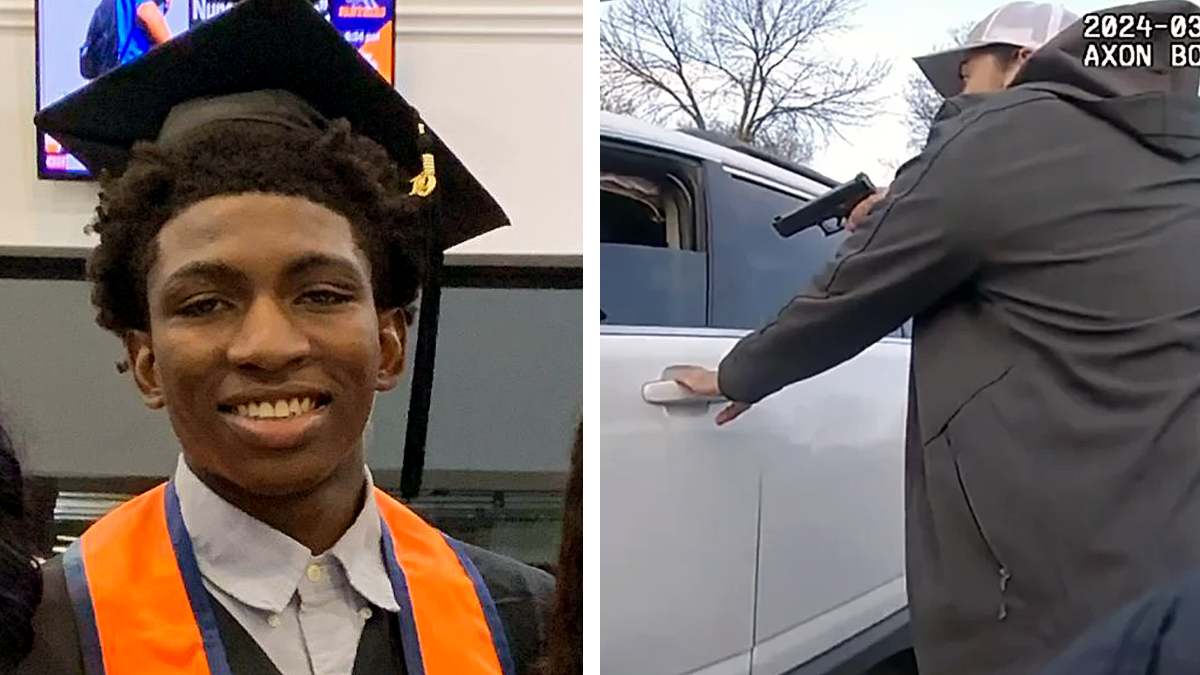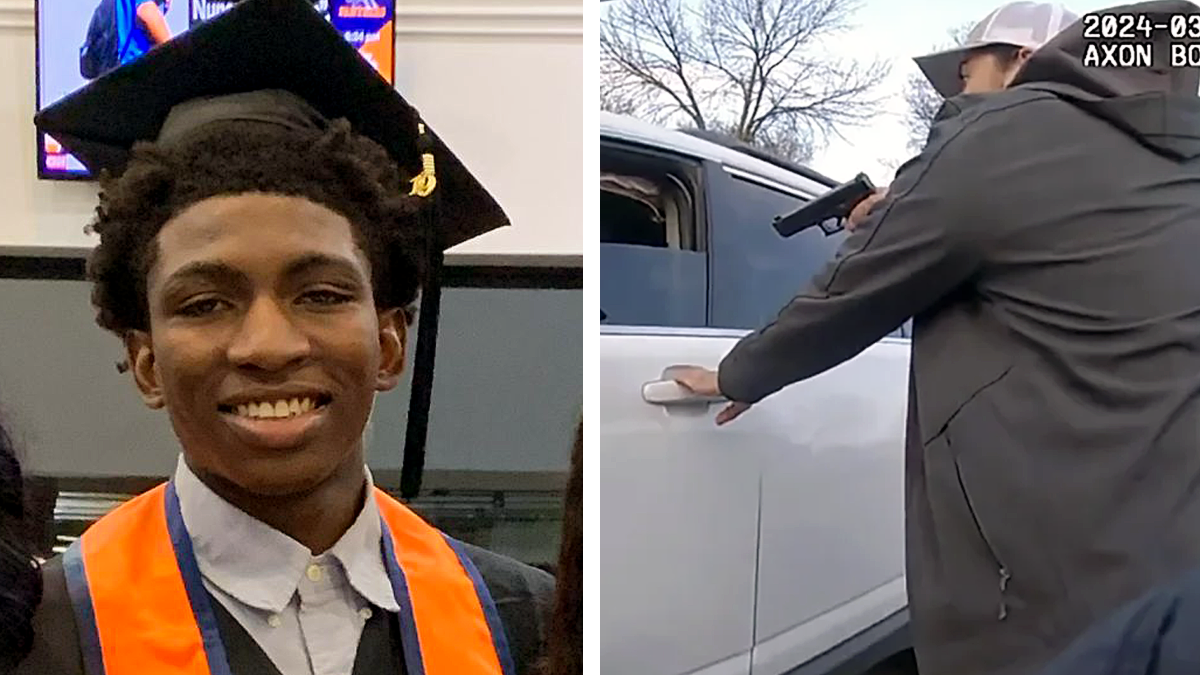‘Open the Door Now!’: Plainclothes Chicago Cops Fired 96 Rounds In 41 Seconds, Killing Black Man Over Tinted Windows. Now, the City Wants to Take Back the Proposed $1.25M Settlement
At first, Chicago police claimed they stopped Dexter Reed for not wearing a seatbelt as he drove through a residential neighborhood last year, hopping out of an unmarked SUV in plainclothes with guns drawn and ordering the 26-year-old Black man to open the door without identifying themselves as cops.
Then when investigators questioned how police were able to spot Reed not wearing his seatbelt through his dark tinted windows, Chicago police changed their narrative to claim they had stopped him over the tinted windows.
Either way, body camera videos show their approach was overly aggressive for what they claimed was nothing more than non-moving traffic infractions punishable by fines.

Even more aggressive was how they shot and killed him by firing 96 rounds in 41 seconds which led to a proposed $1.25 million settlement to his family.
But now Chicago city officials are trying to rescind that settlement with some council members claiming the shooting was justified because Reed had shot at them first.
Videos released by the Civilian Officer of Public Accountability — the agency that first questioned the initial basis of the stop — do not show Reed holding or shooting a gun.
But it does show one plainclothes cop who was standing on the other side of Reed’s car near the passenger door react as if he had been shot — which was followed by dozens of shots fired by the other officers.
Videos show the cops continued shooting Reed after he had stepped out of the car with his hands in the air, showing no gun. And one cop shot him several times after he lay on the ground motionless.
Police say they later found an illegal gun on Reed’s passenger seat — and body camera videos show the cops peering into Reed’s tinted passenger window saying they spotted the gun — but none of the videos released by COPA appear to show the actual gun on the seat.
On Friday, the City Council’s Finance Committee will discuss whether to approve the proposed settlement which would then need to be approved by the Chicago City Council on April 16, according to WTTW.
The city council is made up of 50 aldermen from 50 wards, with several alderman saying the $1.25 million settlement would send the wrong message to Chicago police, restraining them from doing their jobs.
However, the group of cops that killed Reed were the subject of dozens of complaints from minorities for making unwarranted and unconstitutional stops, according to the lawsuit filed by Reed’s family.
And one alderman believes refusing to approve the $1.25 million settlement could result in a much higher payout if the case goes before a jury.
“And then you’re opening up the door for any other similar case to also sue along certain grounds, depending on the precedent that might set,” Alderman Andre Vasquez told the Chicago Tribune in February.
“At root, if this is a case that we could lose in court, it could open us up to losing a lot more money down the line.”
The Shooting
The shooting took place on March 21, 2024, in the Humboldt Park neighborhood on Chicago’s West Side after the group of police officers in the unmarked SUV — who were not wearing seatbelts themselves — pulled in front of Reed’s car, forcing it to stop.
“Roll the window down,” Chicago police officer Alexandra Giampapa ordered.
She also told him to roll the passenger window down, indicating he had both windows rolled up when cops claimed they spotted him not wearing a seatbelt.
“What are you doing?” Giampapa asked after he had rolled the window down.
“I’m not doing nothing,” Reed responded before rolling the window back up.
“Do not roll the window up,” Giampapa ordered, grabbing hold of the door handle and attempting to open it while raising her voice.
Other cops began barking orders including one yelling, “open the f_cking door.”
“OK, I’m trying to,” Reed responded, indicating he may have been genuinely trying to comply but may have been pressing the wrong buttons inside his vehicle that control the windows.
“Open the door now!” Giampapa yells as Reed repeats, “I’m trying to.”
Seconds later, gunfire erupts with the cops shooting 96 rounds in 41 seconds, striking Reed 13 times.
Police say Reed fired first, shooting Chicago police officer Gregory Saint Louis in the forearm, who was standing by the passenger door trying to open it.
But footage from Saint Louis’ body camera footage does not confirm whether he was shot by Reed or by another officer on the other side of the car as he was standing in the direct line of fire.
The Civilian Office of Police Accountability issued a press release on April 9, 2024, saying that “preliminary evidence” shows that Reed fired first.
On Wednesday, COPA spokesman William Caldwell told Atlanta Black Star in an email that “COPA’s investigation is still active and ongoing.”
“Our final summary report will explain how we got to that conclusion based on our video analysis once it is published,” Caldwell said, including last year’s press release in the email.
But even the initial press release from COPA made no mention of the discrepancies between the cops’ claim they stopped Reed for a seatbelt violation when the videos show it would have been impossible to see through his dark windows.
However, Andrea Kersten, who was COPA Chief Administrator at the time, wrote a letter to Police Superintendent Larry Snelling on April 1, questioning the discrepancies.
“Specifically, COPA is uncertain how the officers could have seen this seat belt violation given their location relative to [the] vehicle and the dark tints on vehicle windows,” Kersten wrote in the letter, according to The Chicago Crusader, a weekly newspaper serving the city’s Black community since 1940.
“This evidence raises serious concerns about the validity of the traffic stop that led to the officers’ encounter [Reed].”
Chicago police eventually changed their initial narrative in July 2024, telling local media they had stopped Reed for the dark tinted windows, contradicting their initial claim.
Kersten resigned on Feb. 13 to avoid being fired by Chicago Mayor Brandon Johnson, who vowed to clean up City Hall buy firing “disloyal” department heads, the Crusader reported.
One week prior to her resignation, the city’s largest newspaper, the Chicago Tribune, sided with police on this case, publishing an editorial in February headlined, “City Council should reject proposed $1.25M settlement in Dexter Reed police shooting,” where they criticized Kersten and COPA for seeking accountability.
“The Civilian Office of Police Accountability, the agency that investigates allegations of police misconduct and recommends disciplinary action, released the horrifying video within a few weeks,” states the editorial.
“Andrea Kersten, COPA’s chief administrator, then went on an ill-advised media tour in which she shared preliminary conclusions she’d drawn about what the officers had done wrong.”
Like certain aldermen, the Tribune’s main argument is the claim that Reed shot at the cops before they returned fire which they believe should make his family ineligible for the settlement.
But the lawsuit filed by Reed’s family states the entire stop was unconstitutional, illegal and based on lies, and part of a long established pattern of using pretextual stops on Black people to find something to arrest them on.
“Defendant Officers violated numerous laws and CPD policies during their encounter with Dexter,” the lawsuit states.
“The initial stop was unlawful and pretextual. Defendant Officers had no reasonable suspicion that Dexter violated any law, and they falsely stated otherwise in official CPD reports.”
Watch the video below.

